Taller Far Than a Tall Man
Posted on March 8, 2024A UNC journalism professor remembers
another side of Eric Montross ’94— the time he took with students.
By Tim Crothers ’86
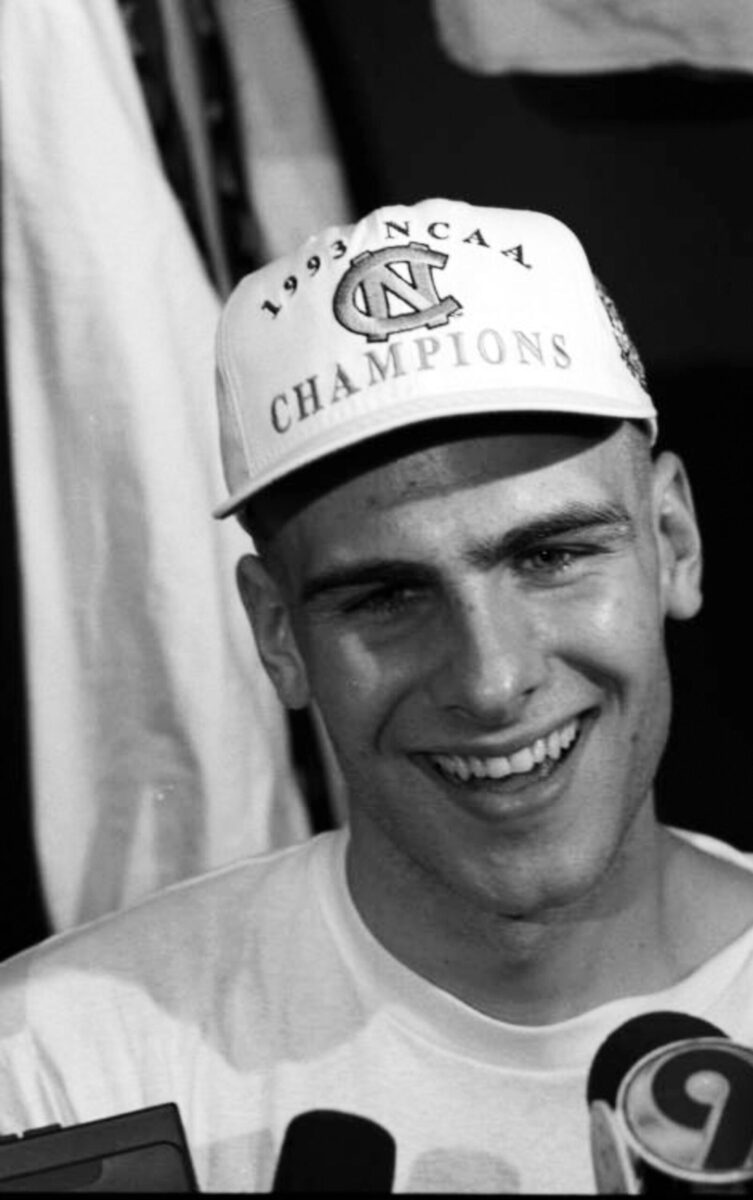
As conspicuously big as he was, his ego was similarly small. Anytime he was asked to talk about himself, his response was served with a helping of self-deprecation. (Photo: UNC Athletics/Hugh Morton)
I didn’t know Eric Montross ’94 that well. Our time together consisted of brief conversations each year on an August evening as we walked together into and out of my classroom at UNC’s Carroll Hall. And, of course, there were those profound 75 minutes in between.
Eric spoke to my journalism students maybe a dozen times. Despite his myriad commitments as a husband, father, broadcaster, fundraiser, etc., Eric never made talking to my Sports and the Media class late on a Tuesday feel like an obligation. Whenever I asked, he would reply that he was “honored” to do it.
In a course that featured a different guest speaker each week, I liked to invite Eric to join us early in the semester. Partly because he could inform my students from so many angles: as a college basketball national champion at UNC, a longtime NBA player and most recently as a Tar Heels radio analyst. But primarily I batted him leadoff to set the motivational tone I sought for the class. When Eric was questioned about journalism, he answered in parables.
Our final class together before Eric’s tragic passing from cancer in December occurred on Aug. 30, 2022. He began that evening, as he usually did, with the following introduction: “Hi, I’m Eric Montross, and I’m excited to be here. I speak in front of people all the time. I speak to businesses. I speak to athletic groups. I speak for a living on the radio when I’m broadcasting, and then I’m a fundraiser for the educational foundation. And yet for me, the only time I kind of get nervous is when I’m in front of you.”
It was a typically humble confession from a father of two who grasped the precious potential of those 75 minutes to inspire the 37 unfinished human canvases before him. He made the very conscious decision to address us as a mentor, that rare 7-foot shepherd.
Eric would often joke about his height. But to borrow a phrase from J.D. Salinger, who borrowed it from the Greek poet Sappho, Eric was “taller far than a tall man.” He filled up a room, his deep voice a mixture of commanding and caring. As conspicuously big as he was, his ego was similarly small. Anytime he was asked to talk about himself, his response was served with a helping of self-deprecation. He told us that August day that growing up he “wasn’t a real coordinated kid,” yet after his senior year at UNC he was not only drafted by the Boston Celtics in the first round, but also by the Chicago Cubs as a pitcher. He also mentioned that he was originally offered a three-year contract to broadcast Tar Heel basketball, but negotiated down to a one-year deal because he thought as an untested rookie they might not like him.
When asked by a student in Crothers’ class to describe the difference between playing in college and in the NBA, Montross said, “I guess because of my age, I view a certain richness to the college experience. … For us, it was running out of the tunnel in the Smith Center, and I remember it to this day: The first time I ran out, the students were going nuts, and you just get a cold chill. And it’s a really great feeling — it just infuses you with energy.
Eric encouraged my students to run the show. He wanted to talk about what they wanted to talk about. He replied to most queries with, “That’s a great question,” and he always remembered the questioner’s name. That day he even recognized one, Thomas Hicks, a regular attendee at Eric’s annual Father’s Day basketball camp a decade earlier. “Thank you for that question, Thomas,” Eric said. “It’s good to see you. I hope you’ll tell your dad and family I said hello.”
Eric was too earnest to be a natural comedian, but he loved to go for the laugh, even if he sometimes had to cue his unsuspecting audience. “I make a lot of funny comments, and laughter is encouraged,” he said tongue-in-cheek that evening. “It makes me feel good when I’m up here. That’s another cue for laughter. … Thank you.”
Eric’s stories were always much bigger than basketball, and the lessons weren’t difficult to decipher.
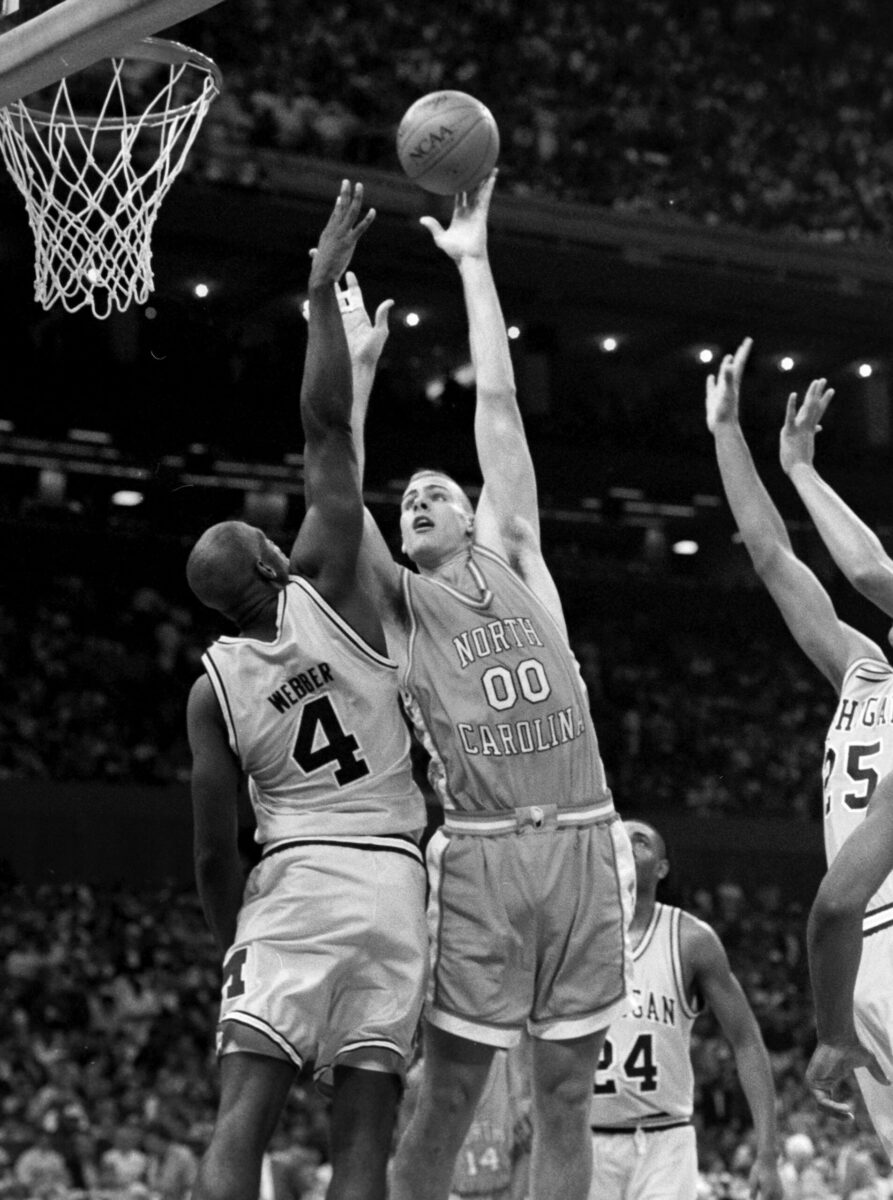
Eric Montross ’94 shoots over Michigan’s Chris Webber in the NCAA championship game April 5, 1993. Montross finished the game with 16 points, helping give the Heels a third national championship. (Photo: News & Observer/Scott Sharpe ’83)
He spoke that August evening about how Coach Dean Smith turned off the scoreboard during Tar Heel scrimmages because, Smith said, “If you play hard and you play the right way, then you know what the score is going to be.”
Eric recalled the time he got stuck in a broken hotel elevator before a pregame meal, eventually arriving 2 minutes late and being informed by assistant coach Bill Guthridge that he wouldn’t start the game that night. There was no such thing as a good excuse. Guthridge simply told him, “You should have left 2 minutes earlier.”
Eric also recounted subbing out of an NCAA tournament game in 1993. When he reached the bench, he noticed Smith’s Hall of Fame ring lying on the court. “Play stops, and I said, ‘Hey Coach, here’s your ring,’ ” Eric remembered. “He said, ‘Oh, Eric, thank you very much.’ He slid that sucker back on his hand and never spoke about it again. It is in the Basketball Museum. You can see it for yourself. And you can thank me when you see it.” (Cue the laughter.)
When asked how Smith influenced him most, Eric took the opportunity to unveil a story — heart-wrenching in retrospect — that he shared every time he appeared in my classroom. “When you’re 18 you start growing up when you get to college,” he said. “There’s nobody looking over your shoulder all the time. You are who you are, and you’re going to change or craft or hone who you are. Coach Smith told us when we got here: Find something outside of your sport that you are equally passionate about and then pour in the same enthusiasm and conviction that you have poured into the game of basketball. For me it was a phone call from the Children’s Hospital to our office when I was a player, and they said they had a young man who was battling a terminal cancer diagnosis and would I go over and visit him? That’s where I first met Jason Clark. Jason later passed, but what I recognized is that because of our notoriety here in this narrow focus of this community and this state and the kids that were in the hospital, that when I walked through the door — and when I go through a door I take up a lot of the door — these kids would smile and in some cases they’d laugh. And I realized that there was a gift that I was given to share my sport, the notoriety, the winning that we had and to give them a little dose of happiness. And then the really cool thing was that when I left the hospital, I felt like I was happier than the kids. They had done more for me than I could possibly have done for them.”
“When you get to know the person, you find that there are so many stories embedded in their lives, and because everybody’s different, everybody’s got something different to share. And so I hope that you think of that as a theme for you moving forward. Don’t just judge a book by its cover. Open it. Read it. Dig deep.”
Whenever possible, Eric preferred to keep himself out of his stories. “I won’t use names, but there was a young man on our basketball team last year, and he came in to see Coach [Hubert] Davis,” he recalled in class. “He said, ‘Coach, I got a B-plus on my English paper that I’d been working on,’ and Coach Davis said, ‘That’s fantastic!’ [Coach Davis] said, ‘I always knew you were such a great writer,’ and [the player] said, ‘Yeah, the professor said I was a really talented writer.’ And then he stopped and he said, ‘Nobody’s ever told me that before. Everybody’s just judged me as a basketball player. That’s only been my identity for all these years.’ And [the player] said, ‘So, I really didn’t know how to take that.’
“I tell you that snippet, only because in this day and age it is really easy to get consumed by headlines, to get consumed by the easy, and the best part of sports, as it is the best part of your friendships with anyone, athlete or non-athlete, is you want to get to know the person. When you get to know the person, you find that there are so many stories embedded in their lives, and because everybody’s different, everybody’s got something different to share. And so I hope that you think of that as a theme for you moving forward. Don’t just judge a book by its cover. Open it. Read it. Dig deep. Do your research. Be prepared. And have fun.”
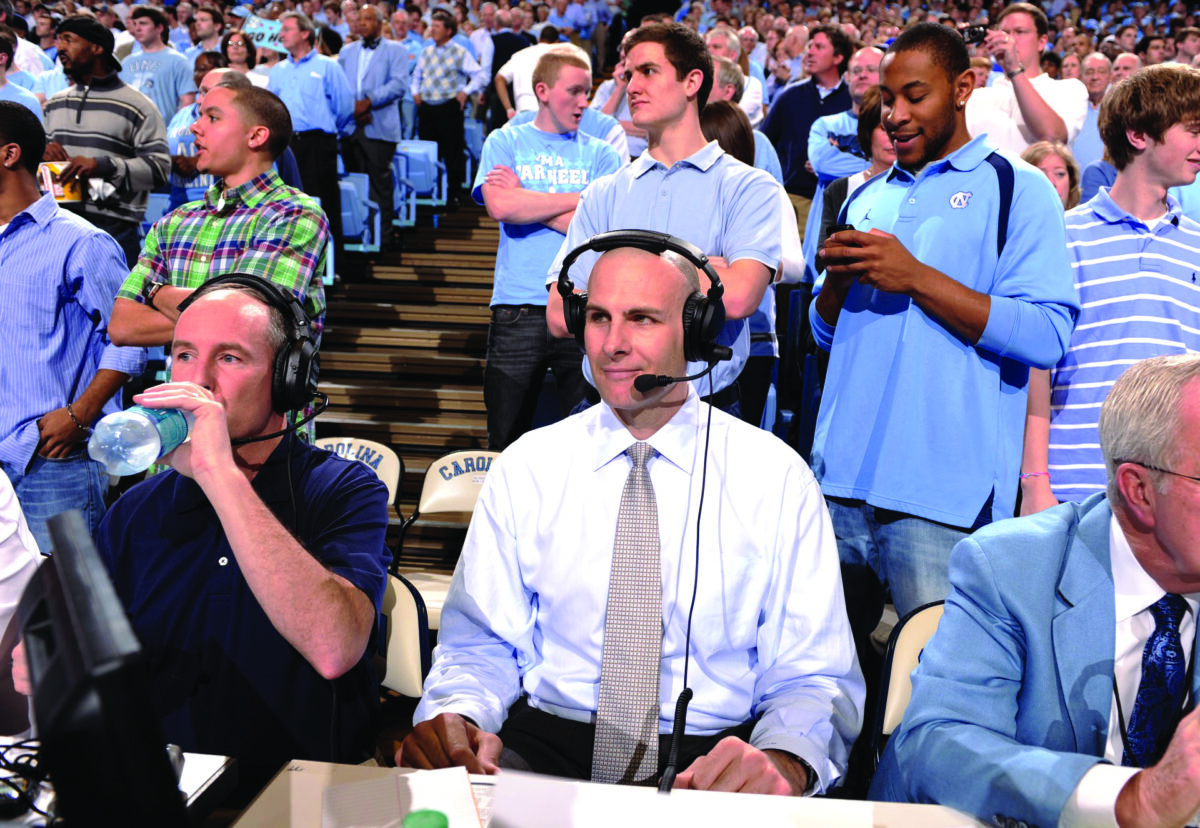
Montross was a color commentator on the Tar Heel Sports Network for almost two decades. (Photo: UNC Athletics)
The final question Eric fielded that evening was about his favorite game he’d covered as a broadcaster. Eric quickly read the room and decided to shed all objectivity for a while. He was just a true-blue Tar Heel among Tar Heels. “The best game to cover?” he began with a sly smile. “Who can guess what that was? That may have happened in March or April because there were two. It was very deeply to the core satisfying to be in Durham on Senior Night. The unlikelihood of our players winning in that environment and them doing it, that was just awesome. The other piece of that, which is equally great because we won, was beating them in the Final Four. I hope you all enjoyed that night because it was really, really good. Make no mistake, neither team wanted to play each other in the Final Four. It’s almost too much. The stakes are too high. I looked behind me 25 minutes after the game, and all of our fans were still there. People who were total strangers were hugging. Were any of you there, by the way? … Three of you were. How great was that?”
After reminiscing briefly with the lucky ones, he said, “I’ll end with that because how else could we end but on a victory over Duke?”
Then, like a preacher, he descended from his pulpit at precisely 6:13 p.m. Two minutes early. I asked if he had any parting words of advice. “I really appreciate your questions,” he told his congregation. “Thank you for your time. This is a special experience for me. I’m telling you that. I hope that you have felt that. I love talking with you. The questions that you ask me are super important, and I hope that you guys have a great, great rest of your college career, whether you’re seniors or whether you’re underclassmen. This is a special place. Whatever you do, jump in all the way. Go under. Jump in the deep end, and you’re going to figure out how to swim. It may not be on your timeline, but you will figure it out.”
The applause began before he could finish.
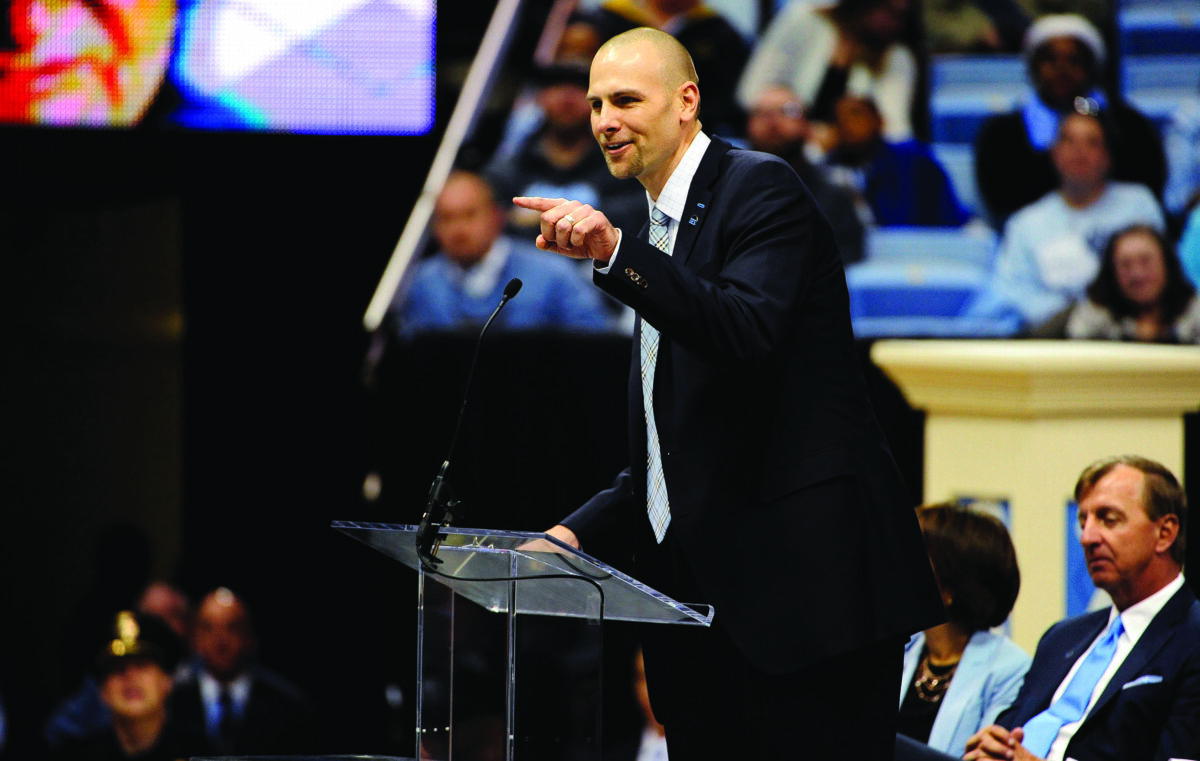
Montross spoke at the memorial service honoring the life of Coach Dean Smith in 2015. When asked by Tim Crothers’ journalism class how Smith had influenced him most, Montross said, “Coach Smith told us when we got here: Find something outside of your sport that you are equally passionate about and then pour in the same enthusiasm and conviction that you have poured into the game of basketball.” (Photo: UNC)
That night when I asked the class to share what they learned from Eric, I received an email from a first-year student named Jordan Gooch, who wrote, “Eric Montross may have been seven feet, but he is down to earth. His ability to joke around and connect with the classroom in such a sincere way through his answers is how anyone should desire to be perceived.”
Gooch’s classmate J Banzet, a junior, wrote: “I vividly remember making the evening trek from Winston-Salem on school nights and leaving the Smith Center listening to Jones Angell [’01]and Montross doing their postgame show. I heard Montross keep things in perspective regardless of the result, which my mom and I appreciated. His stories and insight into everything pre-March 2022 were great, but it’s very obvious what his favorite discussion points were. Some people around the country just will never understand what our two wins over Dook this past season meant, but if they listened to Montross describe the magnitude of those events, I think they could get pretty close.”
Senior Shivan Shah wrote: “Towards the end, when Eric pointed at me to share my experience about going to the Final Four, he said, ‘Come on Shivan, what about you?’ It was a super minor thing, but the fact that he remembered my name from when I asked my question 15 minutes prior and given the number of names he heard today, I thought that was extremely admirable and a trait that I hope to possess in the future. If this is forwarded to him — thanks so much Eric, I truly appreciate it.”
It was forwarded, and Eric replied the next day: “Always enjoy being in your classroom Tim and look forward to next time.”
So, how will we fill the void left by Eric? That’s a great question. Without an answer.
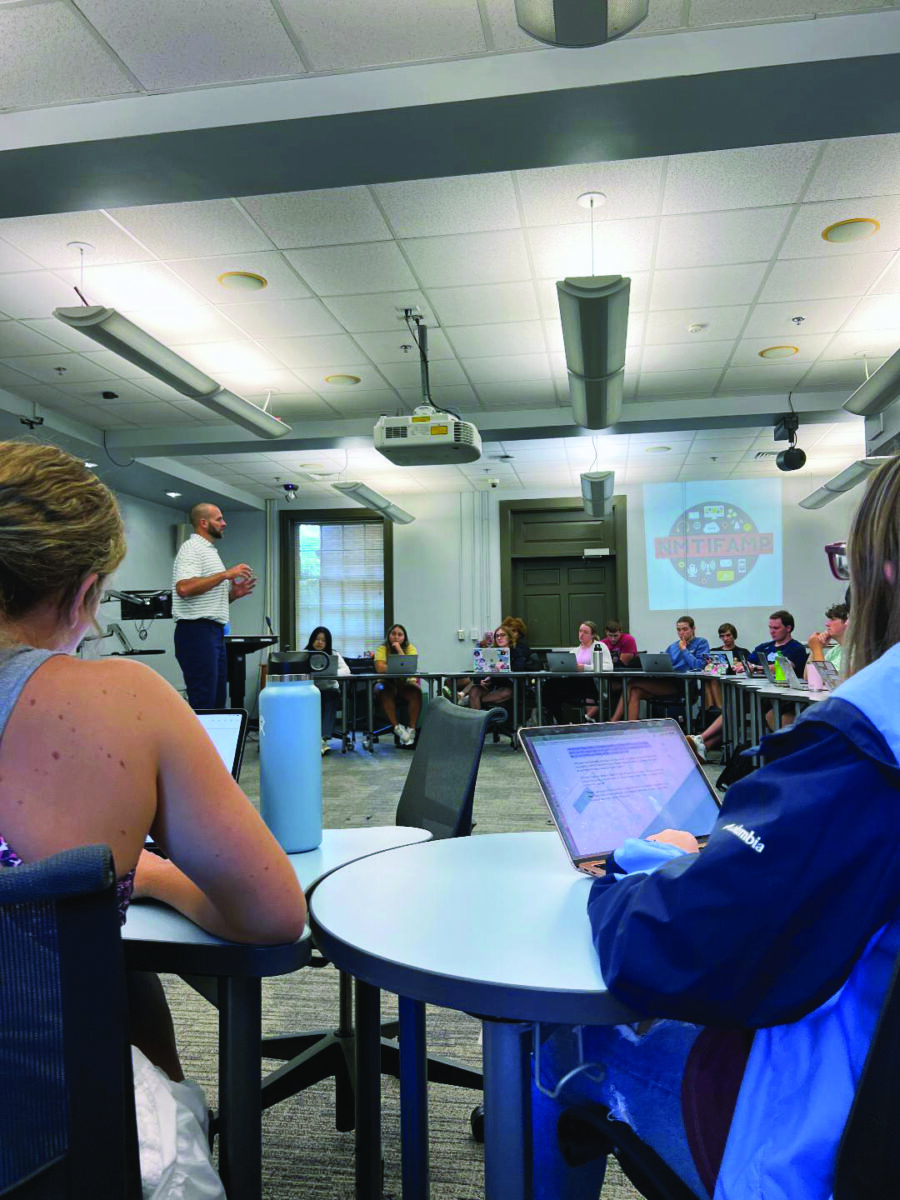
Despite myriad commitments, Montross never made talking to Tim Crothers’ Sports and the Media class feel like an obligation. Whenever Crothers asked, Montross replied that he was “honored” to do it. (Photo: Tim Crothers ’86)
The day after Eric’s passing, when I emailed the 37 students from that 2022 fall semester class to ask if anyone had saved the audio of our Q&A with Eric, many had. Junior Ashley White responded within minutes with the audio file and to commiserate: “I will always consider myself very fortunate to have been able to hear him talk,” she wrote. “He will be dearly missed by the entire Tar Heel community.”
Sophomore Allison Caskey wrote: “I want you to know that his conversation with us truly left such a lasting impact on me — as I know it did for all of us — as his humanitarian outlooks were incredibly powerful. His quote, ‘Whatever you do, jump all the way in and you’ll figure out how to swim,’ also inspired me to finally change my major to fit my true passions and find my place at UNC. Thank you so much for inviting him to speak to us; I will always hold the memories of that evening close to my heart.”
Reminiscing about that remarkable class two years ago, my students used the word “touched” more than they have with any other speaker before or since. Eric could always touch people from across a room and give them a little dose of happiness.
We didn’t know Eric Montross that well. But we felt like we did.
Tim Crothers ’86 is a former senior writer at Sports Illustrated and has taught writing at the Hussman School of Journalism and Media for 23 years.
Thanks for reading the Carolina Alumni Review
Carolina Alumni members, sign in to continue reading.
Not yet a member? Become one today.
